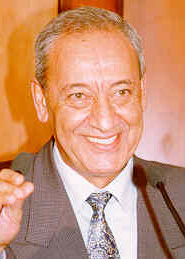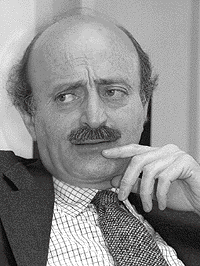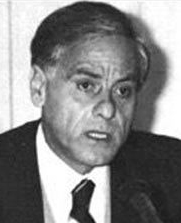Although his family was deeply religious and he attended Catholic schools, Aoun established close friendships with many Muslims during his early years. "We never distinguished between Ali and Peter, or between Hasan and Michel," he later recalled. "We ate together and slept at each other's homes. Their holidays were ours and our holidays were theirs." 2
Aoun finished his secondary education in 1955 and enrolled in the Military Academy as a cadet officer. Three years later, he graduated as an artillery officer in the Lebanese Army. He later received additional training at Chalons-sur-Marnes, France (1958-59), Fort Seale, Oklahoma in the U.S. (1966) and the Ecole Superieure de Guerre, France (1978-80).
During the course of his military career, Aoun earned a reputation for honesty, integrity, and sectarian impartiality that was unrivaled at that time. In 1961, when two Army officers affiliated with the Syrian Social Nationalist Party (SSNP) were arrested for attempting to launch a coup, Aoun personally intervened to stop Army Intelligence from torturing the two men, a practice he felt to be inhumane and immoral. Later, after returning from an assignment and finding that the two men had been tortured while he was away, Aoun condemned the intelligence apparatus for practicing "unacceptable Nazism."
As Lebanon slipped into civil war in the mid-1970's and the army fractured along sectarian lines, Aoun devotion to the central government remained unshaken. In the early 1980's Aoun was head of the "Defense Brigade" of the Lebanese army, a unit stationed along the "Green Line" separating East and West Beirut which engaged in sporadic fighting with Syrian military forces. During the 1982 Israeli invasion of Lebanon, Aoun commanded his troops to block Israeli forces advancing on the presidential palace and was prepared to open fire until President Elias Sarkis personally ordered him to stand down. No other Christian officer attempted to confront the invading army. In late 1982, Aoun was assigned the task of forming and commanding a new multiconfessional unit, the 8th Brigade.
In 1983, Aoun's 8th Brigade defeated Syrian-backed militia forces attempting to overrun the strategic Souk al-Gharb pass overlooking the capital, a battle which one scholar called "the closest thing to real combat the Lebanese Army had ever experienced." 3In recognition of his heroic defense of the capital, Aoun was appointed Brigadier-General.
In June 1984, following the Luzanne reconciliation conference in Switzerland, Lebanon's new "national unity" government fired the commander of the Lebanese Army, Gen. Ibrahim Tannous, who was considered to have sectarian biases. Aoun was handpicked with strong consensus to replace him.
Aoun concentrated his efforts on preserving the strength and unity of the army, which remained in its barracks for the next four years amid the chaos of Lebanon's civil war, laying in wait for the day when it would be called upon to enforce a peace settlement. He intentionally stayed out of the public spotlight--aside from the armed forces' magazine, Aoun gave no interviews to the media between 1984 and 1988.
spite his continuing popular support within Lebanon, however, outside developments doomed Aoun's "revolution" to failure. After the Iraqi invasion of Kuwait in August 1990, the American government desperately sought Syria's participation in the U.S.-led coalition against Baghdad. In return for Syrian support, the Bush administration gave Syria a green light to complete its conquest of Lebanon. 8On the morning of October 13, 1990, Syrian air and ground forces launched an all-out invasion of East Beirut and the surrounding areas controlled by Aoun's government. Realizing that further resistance would only lead to needless loss of life, Aoun went to the French embassy to negotiate a cease-fire under French auspices. As the scale of massacres and mayhem escalated and the presidential palace fell into the hands of the Syrians, Aoun accepted the French ambassador's offer of political asylum. Declaring that Aoun's safety was a "matter of honor," French President Francois Mitterand negotiated the beleaguered general's departure for exile in France ten months later.
Since his departure for exile in France, Aoun's predictions about what would become of Lebanon under Syrian tutelage have proven to be hauntingly accurate. Rather than withdrawing as promised, Syrian military forces have become more entrenched over the last ten years. Rather than restoring Lebanese sovereignty, Syrian officials asserted direct control over the Lebanese political system. Rather than experiencing a respite from the "disappearances" of the civil war, Lebanese have endured arbitrary arrests and detention by Syrian intelligence.
Despite his continuing exile in France, Aoun has remained the country's most prominent opposition figure. Although support for Aoun is most visible within the Christian community, where criticism of the Syrian occupation is less taboo, he has also retained considerable popularity among Lebanese Muslims in the decade following his ouster. According to a 1996 study by Judith Palmer Harik of the American University of Beirut, Aoun ranked third among Shi'ite respondents asked to name their most preferred Lebanese leader in an open-ended survey. In light of the high religiosity of the Shi'ite community, it is not surprising that two prominent and influential clerical leaders ranked above Aoun. What is surprising is that Aoun ranked above Parliament Speaker Nabih Berri , the country's leading Shi'ite politician. 9
As public opposition to Syrian hegemony has intensified since the spring of 1999, Lebanese politicians across the ideological and ethnic spectrum have begun pandering to the public by openly calling for Aoun's return. Most recently, on January 2, Prime Minister Rafiq Hariri pledged on state television to "guarantee that he will not be arrested" if he returns to the country. However, Damascus quickly stepped in to thwart the initiative. In early 2004, Aoun was formally charged and wanted by the law.
















